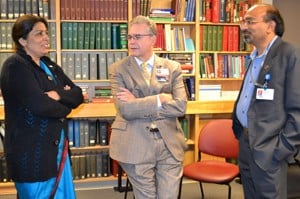UAMS and India University Establish Partnership
April 20, 2011 | Future faculty and student exchanges and collaborative research are expected to follow a recent memorandum of understanding signed by the University of Arkansas for Medical Sciences (UAMS) and the University of Hyderabad in India. “This exchange will go beyond residents, students and education in general,” said Curtis Lowery, M.D., who chairs the Department of Obstetrics and Gynecology in the College of Medicine and led UAMS’ effort to develop the partnership. “We’re talking about global health care and many potential research collaborations. As we patent more, why can’t we patent and sell in India as much as here? Why can’t we help them with things they’re trying to do?” Under the memorandum of understanding, the universities will develop joint educational and research programs in a relationship that “will encompass a mutual learning process, encouraging close cooperation and the advancement of science and medical education and systems and specialty expertise in both the universities.” Hari Eswaran, Ph.D., the UAMS coordinator of the memorandum of understanding, is guiding and assisting with the establishment of collaborative contacts. He also will identify Indo-U.S. funding sources for faculty/student exchanges and workshops and seminars. Eswaran is an associate professor and the SARA scientific director in the Department of Obstetrics and Gynecology. He also is the international telemedicine coordinator for the Center for Distance Health. UAMS’ connection with India began thanks to Eswaran’s scientific contacts in India, who in 2007 linked him and Lowery with then-India President Dr. A.P.J. Abdul Kalam, who was a scientist before becoming president. Kalam helped Lowery establish telemedicine connections with hospitals that he and Eswaran visited that year. Geeta K. Vemuganti, M.D., dean of the University of Hyderabad School of Medical Sciences, visited UAMS in February. She said her school has programs for nursing and optometry, and they are planning to establish a medical school over the next three years. During her two-day visit to UAMS, she toured the campus and gathered ideas to take back to India. She said her immediate priority is to create a clinical skills center and simulation lab modeled after the one at UAMS. “Your clinical skills center and simulation lab are amazing,” Vemuganti said. “These are two things that are entirely different from what I’ve seen, whether at national or international institutions.” She said she also is looking forward to an active student exchange program. “The global exposure for the students is a priority,” she said. Vemuganti said she was impressed by the hospitality shown to her. “All of the deans were very approachable. They all took the time to talk about their institution, and everyone asked me, ‘What can we do for you?’” Lawrence E. Cornett, Ph.D., the executive associate dean for research in the College of Medicine and the UAMS vice chancellor for research, said he foresees good things coming out of the partnership. “Establishing this relationship with the University of Hyderabad should enable UAMS scientists and students to increase their competitiveness for grants from federal agencies that support collaborative international science projects, for example the National Institutes of Health Fogarty Center,” Cornett said. “Conversely, University of Hyderabad scientists and students will have additional opportunities for awards from agencies in India that support joint India-U.S. projects,” he said. This partnership is supported in part by the UAMS Center for Clinical & Translational Research (CCTR), which helps stimulate community engagement through local, national and international collaborations. The UAMS CCTR is part of a national Clinical and Translational Science Award (CTSA) consortium created to accelerate laboratory discoveries into treatments for patients. The CTSA program is led by the National Institutes of Health’s National Center for Research Resources.
|
